Randy Alcorn's Blog, page 54
June 1, 2022
Bert and Colleen Elliot: Two “Average” Followers of Jesus Who Left an Example of Faithfulness

At my home church in January 2006—the fiftieth anniversary of the death of five missionaries in Ecuador—I interviewed Steve Saint, son of martyr Nate Saint, and Mincaye, one of the tribal warriors who killed the missionaries and later came to faith in Christ.
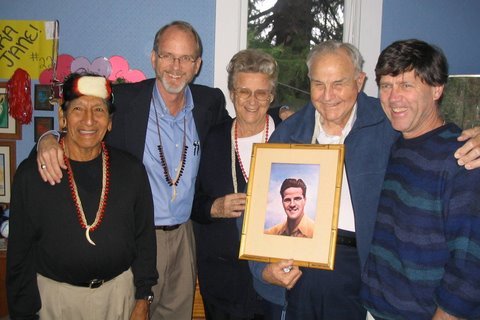 Afterward, my wife, Nanci, and I, along with our friends Stu and Linda Weber, joined Steve McCully, son of martyr Ed McCully, and Bert and Colleen and other Elliot family members, including Gilbert and Susan Gleason, for dinner at Jim and Bert’s childhood home in Portland, Oregon. We spent an unforgettable afternoon with members of three of the five martyred missionaries’ families.
Afterward, my wife, Nanci, and I, along with our friends Stu and Linda Weber, joined Steve McCully, son of martyr Ed McCully, and Bert and Colleen and other Elliot family members, including Gilbert and Susan Gleason, for dinner at Jim and Bert’s childhood home in Portland, Oregon. We spent an unforgettable afternoon with members of three of the five martyred missionaries’ families.
What I most enjoyed that day was time spent talking alone with Bert Elliot. When I asked him about their ministry in Peru, Bert’s eyes lit up as he said, “I can’t wait to get back from furlough!” At that time, he and Colleen were in their eighties and nearing their sixtieth year as missionaries, with no intention of retiring. They were vibrant—still joyfully excited about reaching people for Christ.
Prior to that Sunday I knew a great deal about Jim Elliot and Nate Saint, and a little about the three other missionary martyrs. I knew absolutely nothing about Bert and Colleen. Though aware their home was less than two miles from where my wife grew up in Portland, we didn’t even realize that Jim had a brother. We had no clue that in the 1940s Bert and Colleen attended the same college that Nanci and I had attended in the seventies, then known as Multnomah School of the Bible.
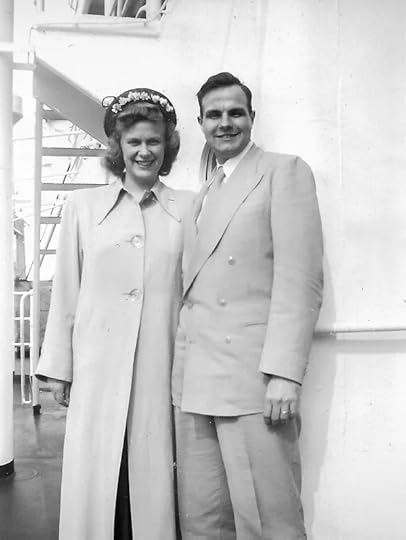 After returning home that night, I searched online and found only one article with much information about Bert and Colleen. It said they’d planted over 158 churches in Peru. (Of course, Bert didn’t tell me that.) They served Christ faithfully, almost completely under the radar of the church at large.
After returning home that night, I searched online and found only one article with much information about Bert and Colleen. It said they’d planted over 158 churches in Peru. (Of course, Bert didn’t tell me that.) They served Christ faithfully, almost completely under the radar of the church at large.
I will never forget what Bert said about Jim that day in his childhood home. Tears formed in his eyes as he spoke. “Jim and I both served Christ, but differently.” He paused and cleared his throat. “Jim was a great meteor, streaking through the sky.”
Bert stopped there. He didn’t go on to describe himself, but here is what came to my mind: Unlike his brother Jim—the shooting star everyone learned about in LIFE magazine and numerous books—Bert was a fifth-magnitude star, a mere pinpoint of light, rising night after night, faithfully crossing the same path in the sky, to God’s glory. A star so faint that no one knew its name or pointed it out. Millions have quoted his younger brother, Jim, who went to Ecuador three years after Bert went to Peru. But I’ve never heard a sermon or read a book quoting from Bert Elliot. Not until Gilbert Gleason, nephew to the Elliots by marriage, wrote Love So Amazing.
Gilbert writes, “Bert and Colleen serve as the right kind of examples for ‘average’ followers of Jesus, proving that, for most of us, substantial, supernatural impact is achieved through simple daily faithfulness, listening to Jesus and loving people in His name.”
I’m struck by Gilbert’s description of Bert and Colleen being “average.” Of the well-known modern martyrs, Jim Elliot has become—and in some ways, in real life truly was—an almost mythical character. I’ve read what he said and did, and, while he’s had great impact on my life, at times he seems far beyond me and other mortals. I’m tempted to think of Jim as a superhero to admire, rather than an example to follow.
Bert was different. He wasn’t like the sprinter who wins the Olympic gold medal. He was like the clerk or custodian who jogs a nine-minute mile three miles a day and, over his lifetime, runs much farther than the pro who retires at thirty. Bert and Colleen just kept serving, faithfully and joyfully, for sixty-two years. They modeled true humility and sacrificial love for God and others.
Missionary work sometimes culminates in unforgettable martyrdom. More often it involves what Eugene Peterson called “a long obedience in the same direction”—years spent dying daily to self and living moment-after-moment for Jesus. Certainly, I believe Jim Elliot’s reward is considerable, but it wouldn’t surprise me to discover that Bert and Colleen’s is greater still.
After visiting Bert and Colleen in Peru, Lars Gren, Elisabeth Elliot’s husband, wrote, “They are available for any who call or ring the doorbell, whether expected or unexpected. Along with open doors, there are the Bible studies, their involvement in the Christian School . . . Plus an exceptional drug program leading addicts into a new life based on Scripture . . . All this after fifty-six years on the field with no thought of the rocking chair or hanging out a shingle saying, ‘Busy. Please call again.’ What a life of service.”
Bert and Colleen may not have made much difference on Google and Twitter, but God was their Audience of One. He says a book of remembrance is written for his faithful servants (Malachi 3:16), and Jesus promised, “If anyone gives even a cup of cold water to one of these little ones who is my disciple, truly I tell you, that person will certainly not lose their reward” (Matthew 10:42, NIV).
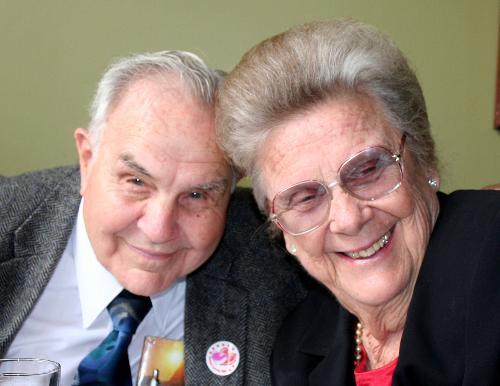 Bert and Colleen’s life reminds me of the man Jesus described in a parable: “The Kingdom of Heaven is like a treasure that a man discovered hidden in a field. In his excitement, he hid it again and sold everything he owned to get enough money to buy the field” (Matthew 13:44, NLT).
Bert and Colleen’s life reminds me of the man Jesus described in a parable: “The Kingdom of Heaven is like a treasure that a man discovered hidden in a field. In his excitement, he hid it again and sold everything he owned to get enough money to buy the field” (Matthew 13:44, NLT).
When we read he “sold everything he owned” to obtain the treasure, we might feel sorry for him, because his sacrifice was great. But he didn’t feel sorry for himself; on the contrary, he couldn’t believe how fortunate he was! (The point, of course, is not the value of temporary treasure, but the eternal treasure it represents.)
Though Bert and Colleen served in Peru over 75 percent of their lives, they would say the sacrifice was nothing compared to what they gained, even in this life! And gauged by their forever lives, the payoff will be unimaginable and eternal! Because their sacrifices were eclipsed by joy, to them they seemed small.
In 2012, a few days after Bert died, I wrote an article about him that, in God’s providence, was reprinted by many, including Focus on the Family. I’m delighted to say you can now find far more about Bert and Colleen than I was able to when I first tried. Certainly Love So Amazing provides a great wealth of information unavailable until now.
It was a great honor to be asked to speak at Bert’s memorial service, but I had to decline because of a prior commitment I couldn’t cancel. I was amazed to learn that Colleen died the day before Bert’s service! It became a memorial for both of them. I wished I could have been there. But there’s something far better than a wish, and that’s the promise of Jesus: I will see Bert and Colleen again—and will partake in a joyful reunion with countless Christ followers I’ve known and far more I haven’t met but will. It is not wishful thinking that one day all of us who know Jesus will walk the New Earth together. It is a certainty bought, paid for, and written in Jesus’ blood.
If you love and follow Jesus as the Elliots did, you won’t have to regret that you didn’t know Bert and Colleen. Because one day you will. In countless magnificent dinners and other celebrations, full of laughter and delight, we will meet and hear the stories of thousands of people from those 150-plus churches God raised up through His faithful, humble, and happy servants, Bert and Colleen Elliot. And that will be a tiny sampling of the adventures that await us, by the grace of our Lord Jesus Christ.
Love So Amazing: The Missionary Biography of Bert and Colleen Elliot is available on Amazon in print and on Kindle.
May 30, 2022
Living as People of the Truth in a Post-Truth World
From Randy: Today’s blog is by Sara Barratt, from her book Stand Up, Stand Strong, which was recently released.
Stand Up, Stand Strong is an extraordinary book. Sara clearly understands the appealing but deceptive cultural values that confuse and derail countless believers, who, apart from learning to think critically, will likely abandon their faith. Sara is immersed in a biblical worldview that permeates everything she says. She writes with rare wisdom and insight. Often, I read books that don’t quite live up to what they could have been. This one actually does. I highly recommend it for young people everywhere. Older believers could benefit just as much—this is a terrific book for families, groups and churches to discuss together!
Hope you enjoy these reflections from Sara on the subject of truth.
In 2016, the Oxford Dictionary named post-truth their word of the year.
According to their definition, post-truth is “relating to or denoting circumstances in which objective facts are less influential in shaping public opinion than appeals to emotion and personal belief.”
A post-truth environment exists when people are directed by subjective feelings rather than objective facts. A post-truth world is not one in which truth has ceased to exist, but one in which truth has ceased to matter. Truth becomes personal, all “truths” (aka opinions) are equally valid, and feelings have the upper hand. “What’s true for you doesn’t have to be true for me” is the mantra of the post-truth age.
We’re all susceptible to this. Just a glance around our culture and within our own hearts makes that abundantly clear. We innately stick with beliefs and ideas that make us feel good. While post-truth mindsets are becoming more evident culture-wide, these seeds of relativistic thinking grow in each of our hearts.
This clash with truth occurs on a daily basis in ways big and small. Have you ever read a news story only to find out later it was slanted to the writer’s agenda and didn’t tell the full story? Or have you ever seen someone believe something (or held a belief yourself) just because it was posted on social media when a few moments of research would have quickly debunked the idea? Or had a conversation and listened to someone stubbornly hold to their perspective even if concrete facts supported another view? Each of these examples point to a post-truth mindset.
In short, we want truth when it conforms to our own point of view and affirms what we already believe. Facts are willingly sacrificed to project an agenda or affirm one’s own bias.
Post-truth thinking is able to thrive because people have become confused on what truth even means. What is truth, anyway? Is it possible to know truth? How can you be certain of what’s true?
The answer to these questions comes when we understand the various forms of truth that exist. One form is subjective truth. “Country music is the best” is an example of subjective truth. That statement is 100 percent true in my opinion because I love country music, but the same statement is 100 percent false for someone who can’t stand John Denver or Carrie Underwood. The statement is only true for people who enjoy country music—it’s a subjective truth claim because it deals with preference and personal taste. In cases of subjective, personal inclinations, “True for you, but not for me” is, well, true.
On the other hand, there is objective truth. “Grass is green,” “George Washington was the first president of the United States,” and “Two plus two equals four” are all statements of objective truth. You can’t argue with them and you can’t disagree with them. They’re simply statements of reality. In cases of objective actuality, “True for you, but not for me” is simply ludicrous.
Secular culture doesn’t deny the existence of objective truth (you’ll never find a politician arguing that grass really isn’t green . . . I hope). But it does argue over what does and does not equal objective truth. Matters of religion, morality, and identity have all moved from the “objective” category into the “subjective.” “Jesus is the Son of God,” “Gender is fixed, not fluid,” and “Marriage is meant to be between a man and a woman” are now considered statements more reflective of personal opinion than objective reality. But that all depends on who gets to determine objective reality.
According to culture, we are the ones who get to decide based on our preferences. According to God, He is the only One who has the authority to make that distinction. Moral absolutes do exist if a moral authority also exists. But because even the existence of God has become a subjective truth, everything else in our lives and society that really matters has also been relegated to the realm of the subjective. And post-truth is born the moment the objective is placed in the position of the subjective.
Post-truth thinking is deadly. If we don’t know the truth, how will we know how to live? How will we define right and wrong? For Christians seeking the absolute truth of God, post-truth thinking is incredibly serious.
Every generation since Adam and Eve has experienced forms of post-truth thinking, as humanity has attempted to rewrite the script of truth with their own opinions. As Proverbs says, “All the ways of a man are pure in his own eyes, but the LORD weighs the spirits” (16:2). We all want our ways to be right. But our ways are human and fallible. God’s are not. God’s truth is founded upon reality as much as “two plus two equals four.” In fact, more so. Without God’s truth, no other truth would exist, and we’d be floundering in a world where everything is subjective. God gave us the gift of truth so we could live with clarity, wisdom, and order. But to do so, we have to accept His standards above our own.
Is it any wonder there’s an attack on truth in our society when the enemy of our souls is the father of lies? Satan “does not stand in the truth, because there is no truth in him. When he speaks a lie, he speaks from his own resources, for he is a liar and the father of it” (John 8:44). Why wouldn’t Satan target truth? Getting people to doubt truth and believe lies causes them to speak his native language.
God, however, is the opposite of post-truth. Every word God says is true. Every aspect of God is true. There are no hidden theories or shady agendas when it comes to God. Truth matters to God. That’s why truth should matter to us.
As Jesus Himself said, “I am the way, the truth, and the life. No one comes to the Father except through Me.” (John 14:6) Truth is not a personal preference. Truth is a person, and that person is Christ.
Sara Barratt is a 22-year-old author, speaker, and Editor-in-Chief of TheRebelution.com. She's the author of Love Riot and Stand Up, Stand Strong: A Call to Bold Faith in a Confused Culture. Her passion is challenging teens to live sold-out and set-apart for Jesus. Connect with her on her website sarabarratt.com and on Facebook and Instagram.
Photo by Michael Carruth on Unsplash
May 27, 2022
We Would Do Well to Dig Deep into God

Note from Randy: Here’s another precious insight from Nanci’s journal. One of the verses she shares, Jeremiah 17:8—the image of us being a tree with roots deeply planted in Jesus—is a favorite of ours.
Dig. Dig down deep into God’s person, His character, His works, His promises. Plant yourself by streams of water. Dig your roots deep into the stream.
Do this in order to know God. Do this as your only source of perspective, of understanding, of strength, of patience, of forbearance, of joy in all that God has as His plan for you.
The more you do it in advance of suffering, the more you have of God’s provision deep in your soul (water) to thrive.
Suffering is a mercy sent by God to cause us to dig deeper into Him. The great difficulty lies when we face suffering “on an empty tank.” Our leaves wither. Our fear comes. We become anxious. We cease to bear fruit.
“But blessed [happy] is the one who trusts in the Yahweh, whose confidence is in him. They will be like a tree planted by the water that sends out its roots by the stream. It does not fear when heat comes; its leaves are always green. It has no worries in a year of drought and never fails to bear fruit” (Jeremiah 17:7-8).
“Blessed [happy] is the one who does not walk in step with the wicked or stand in the way that sinners take or sit in the company of mockers, but whose delight is in the law of the Yahweh, and who meditates on his law day and night. That person is like a tree planted by streams of water, which yields its fruit in season and whose leaf does not wither—whatever they do prospers” (Psalm 1:1-3).
When our roots reach deep into the knowledge of God, when suffering comes, our fruit is yielded in its season, all that we do prospers, and our leaves remain green.
And not because we are somehow working up strength from within ourselves; but because the pipeline is already in place. God is the only source of survival and growth—spiritually—in our suffering.
And we would do well to dig deep. The deeper we plumb God, the more resources we have.
Photo by Pixabay
May 25, 2022
He Will Turn Our Grief into Joy

God doesn’t only promise to replace our grief with joy, but to turn it into joy. Jesus said, “I tell you the truth, you will weep and mourn while the world rejoices. You will grieve, but your grief will turn to joy. A woman giving birth to a child has pain because her time has come; but when her baby is born she forgets the anguish because of her joy that a child is born into the world. So with you: Now is your time of grief, but I will see you again and you will rejoice, and no one will take away your joy” (John 16:20–22).
Jesus could have said, “Your grief will end, and joy will begin,” or, “Joy will replace your grief.” But these would separate the grief from the joy. Christ’s words connect them: your sorrow will turn into joy (verse 20, ESV). It could be translated “your grief will become joy.” The Message puts it, “You’ll be sad, very sad, but your sadness will develop into gladness.” (Similarly, sorrow turns into joy in Esther 9:22, wailing turns into dancing in Psalm 30:11, and mourning turns into gladness in Jeremiah 3 1:13.)
A woman giving birth suffers in a way directly connected to her impending joy. The child comes through suffering, and therefore the joy of having the child flows out of suffering. God transforms suffering into joy. Joy both eclipses and redeems the suffering.
Moffatt translates Romans 8:22, “The entire creation sighs and throbs in pain.” There’s a radical difference between death pangs, which anticipate an ending and look backward, and birth pangs, which anticipate a beginning and look forward. The old, fallen, cursed Earth, convulsing and groaning in the final pains of childbearing, will birth a New Earth. Earth will not merely survive, it will live forever, in ever-increasing wonder and glory—as will we, its caretakers, redeemed and birthed through the pains of this present time.
In Tolkien’s Return of the King, Aragorn says, “Dawn is ever the hope of men.” King David wrote, “Weeping may last for the night, but a shout of joy comes in the morning” (Psalm 30:5, NASB).
The night may seem long, but the truth is this: once it comes, the morning will never end.
Neither will the joy.
For more related to the subject of suffering, see Randy’s book If God Is Good , as well as the devotional 90 Days of God’s Goodness and book The Goodness of God .
Photo by Iswanto Arif on Unsplash
May 23, 2022
Nanci’s Death Isn’t the End of Our Relationship, Only a Temporary Interruption

I’ve been reflecting on the changes in our home with Nanci gone. The house is so quiet without the sound of her laughter. There is a profound sense of absence.
Our double doodle Gracie clings to me and is by my side day and night. I think she misses Nanci as much as I do. We are grieving together. Someone said to me that it must be tough to come home to an empty house. But I don’t. I come home to Gracie, and she reminds me constantly of Nanci. (Trust me, Nanci wouldn’t be offended by that!)
 I’m struck by my loss of a sense of time. Time is fluid. Two weeks after Nanci died, it seemed like it happened yesterday. Yet in another sense, it seemed long ago. Even before she died, I had to look at my watch, not to see what time it was, but what day it was, and occasionally what month.
I’m struck by my loss of a sense of time. Time is fluid. Two weeks after Nanci died, it seemed like it happened yesterday. Yet in another sense, it seemed long ago. Even before she died, I had to look at my watch, not to see what time it was, but what day it was, and occasionally what month.
Reminders of her absence are everywhere: the mail she sorted through, the bills she paid, the giving checks she wrote on our behalf, the things in our freezer and cupboards, the groceries she bought. On April 3, I sent my daughter Karina a birthday greeting, like I always do. And it suddenly occurred to me that Nanci always sends the presents! So I thanked God for Amazon and emailed Karina a gift card.
There were movies we were waiting to watch together when they came out. Now I can watch them, but I’m aware how much more fun it would have been to watch them with her. I hear about the next season of a show we enjoyed, and my instinctive reaction is to tell Nanci so we can watch it together.
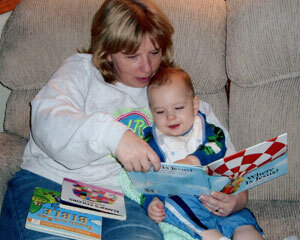 I’m learning all the things Nanci did over the years that I didn’t see or think about—like the clothes that were always magically in my drawers and hanging in the closet. I started learning to do the wash in Nanci’s final year, but she had to tell me what to do, and how much detergent and fabric softer to use. Now she isn’t here to remind me, so when I didn’t have something to wear, I realized it was time to wash clothes. Not long ago I was looking at a bottle that only said “All” but nowhere said detergent. Apparently, I was the only person in the world who didn’t know it was laundry detergent. (I had to call my daughter Angela for help!)
I’m learning all the things Nanci did over the years that I didn’t see or think about—like the clothes that were always magically in my drawers and hanging in the closet. I started learning to do the wash in Nanci’s final year, but she had to tell me what to do, and how much detergent and fabric softer to use. Now she isn’t here to remind me, so when I didn’t have something to wear, I realized it was time to wash clothes. Not long ago I was looking at a bottle that only said “All” but nowhere said detergent. Apparently, I was the only person in the world who didn’t know it was laundry detergent. (I had to call my daughter Angela for help!)
It’s true that I haven’t lost Nanci because I know where she is. I’m not concerned about her safety or well-being because she is safely home, and better off than she ever was in this world under the Curse. But I miss her so much. I frequently have the instinct to “tell Nanci.” Yet I am so aware of where she is. I often ask Jesus to tell her about her grandsons’ tennis and track accomplishments, and I have no doubt He does, as I can’t think of a single reason He wouldn’t.
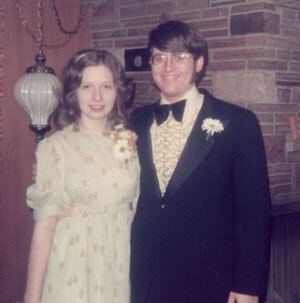 We wanted to grow old together. If you’d told us when we got married at 21 that we would live to be 68, we would have said, we DID grow old together! But when you’re 68, it’s like the new 48. Nanci and I were married in 1975, but we were best friends from the day we met as freshmen in high school, December 7, 1968. She was my closest friend for 53 and a half years. That is a privilege and a treasure. I will not regret the years we might have had but be profoundly grateful for the years we did have—and not just the quantity, but the quality.
We wanted to grow old together. If you’d told us when we got married at 21 that we would live to be 68, we would have said, we DID grow old together! But when you’re 68, it’s like the new 48. Nanci and I were married in 1975, but we were best friends from the day we met as freshmen in high school, December 7, 1968. She was my closest friend for 53 and a half years. That is a privilege and a treasure. I will not regret the years we might have had but be profoundly grateful for the years we did have—and not just the quantity, but the quality.
Her homegoing has left a great hole in my life. But isn’t that what I would want? Healthy sorrow recognizes the size of the loss. The only way for the sorrow to be less would be for the loss to be less. Would I choose to have less pain because she meant less to me? Of course not. Sorrow can be great even while we recognize it to be temporary. Nanci’s death wasn’t the end of our relationship. It was only an interruption—to be followed by the Great Reunion.
May 20, 2022
We Are Certain in Our Uncertainty

The following paragraphs from Oswald Chamber’s classic, My Utmost for His Highest, really connect with Nanci’s four years of yielding to God about all the things she was constantly uncertain about. While she never knew if the day’s diagnosis would change tomorrow, or if the cancer would spread or go into remission, or how long she’d have the strength to handle everyday situations, still she would say, “I am certain of Him, so I will be content with all those things I’m uncertain of.”
I miss Nanci terribly, but the Lord is with her and is with me, and that closes the gap between us considerably.
“It doth not yet appear what we shall be.” 1 John 3:2
Naturally, we are inclined to be so mathematical and calculating that we look upon uncertainty as a bad thing. We imagine that we have to reach some end, but that is not the nature of spiritual life. The nature of spiritual life is that we are certain in our uncertainty, consequently we do not make our nests anywhere. Common sense says—“Well, supposing I were in that condition….” We cannot suppose ourselves in any condition we have never been in.
Certainty is the mark of the common-sense life; gracious uncertainty is the mark of the spiritual life. To be certain of God means that we are uncertain in all our ways, we do not know what a day may bring forth. This is generally said with a sigh of sadness; it should be rather an expression of breathless expectation. We are uncertain of the next step, but we are certain of God. Immediately we abandon to God and do the duty that lies nearest, He packs our life with surprises all the time. When we become advocates of a creed, something dies; we do not believe God, we only believe our belief about Him. Jesus said, “Except ye…become as little children.” Spiritual life is the life of a child. We are not uncertain of God, but uncertain of what He is going to do next. If we are only certain in our beliefs, we get dignified and severe and have the ban of finality about our views; but when we are rightly related to God, life is full of spontaneous, joyful uncertainty and expectancy.
“Believe also in Me,” said Jesus, not—“Believe certain things about Me.” Leave the whole thing to Him, it is gloriously uncertain how He will come in, but He will come. Remain loyal to Him.
Photo by Emmanuel Phaeton on Unsplash
May 18, 2022
We May Not Long for Death, But We Long for Heaven

Isaiah 25:8 says, “He will swallow up death forever! The Sovereign LORD will wipe away all tears… The LORD has spoken!” (NLT). God could have said death will cease or come to an end. Or fade away. But no, like a great lion, God is stalking Death as His prey. When the moment is right, He will attack, take death by the throat, break its neck, and consume it. Death will not die of natural causes. God will kill it once and for all. The work is already done. His death and resurrection will ultimately overcome. Yet death is still with us. Death is already defeated, but not yet—this is the “already and not yet” paradox.
When Jesus annihilates death, it shall be no more. We will not fear it, and it will have no hold on us. Don’t you long for that day?
Below are some quotes on death and longing for Heaven, our eternal home, that I cite in Eternal Perspectives.
I may not long for death, but I surely long for heaven. —Joseph Bayly, A Voice in the Wilderness
It ought to be the business of every day to prepare for our last day. —Matthew Henry
Let us greet the day which assigns each of us to his own home, which snatches us from this place and sets us free from the snares of the world, and restores us to paradise and the kingdom. Anyone who has been in foreign lands longs to return to his own native land. . . . We regard paradise as our native land. —Cyprian, Mortality
To come to Thee is to come home from exile, to come to land out of the raging storm, to come to rest after long labour, to come to the goal of my desires and the summit of my wishes. —Charles Spurgeon, Morning and Evening
A man on his deathbed turned to his physician and mumbled, “What is Heaven like, Doctor?” How could the physician describe Heaven in such brief moments? As his mind searched for an answer for his friend, the doctor heard his dog scratching at the door. “Can you hear my dog scratching at your door?” inquired the physician. The sick man assured him that he could. “Well,” the doctor said, “Heaven must be like that. My dog does not know what is in this room. He only knows he wants to be with me. So it is with Heaven! Our Master is there. That is all we need to know!” —James Jeremiah, The Place Called Heaven
Christian, meditate much on heaven, it will help thee to press on, and to forget the toil of the way. This vale of tears is but the pathway to the better country: this world of woe is but the stepping-stone to a world of bliss. And, after death, what cometh? What wonder-world will open upon our astonished sight? —Charles Spurgeon, Morning and Evening
Most people, if they had really learned to look into their own hearts, would know that they do want, and want acutely, something that cannot be had in this world. There are all sorts of things in this world that offer to give it to you, but they never quite keep their promise. …There was something we grasped at, in that first moment of longing, which just fades away in the reality. —C.S. Lewis, Mere Christianity
Can you hear the sighing in the wind? Can you feel the heavy silence in the mountains? Can you sense the restless longing in the sea? Can you see it in the woeful eyes of an animal? Something’s coming . . . something better. —Joni Eareckson Tada, Heaven: Your Real Home
All of us are homesick for Eden.
We yearn to return to a land we’ve never known.
Deep is the need to go back to the garden,
A burning so strong, for a place we belong,
A place that we know is home. —Paul Smith, quoted in Homesick for Eden
O Lord,
I live as a fish in a vessel of water,
only enough to keep me alive,
but in heaven I shall swim in the ocean.
Here I have a little air in me to keep me breathing,
but there I shall have sweet and fresh gales;
Here I have a beam of sun to lighten my darkness,
a warm ray to keep me from freezing;
yonder I shall live in light and warmth for ever
Quicken my hunger and thirst after the realm above.
—The Valley of Vision: A Collection of Puritan Prayers
One of the most disconcerting experiences which can come our way is to make a long journey, perhaps even to the other side of the world, and to discover on arrival that we have not been expected. The hotel reservation has not been made, or, even more devastating, the friendly home is all locked up and the warm welcome we have anticipated over the miles is not awaiting us, due to a mix-up of dates or the loss of a letter or e-mail. Heaven, however, is guaranteed not to disappoint…We are expected. —Bruce Milne, The Message of Heaven & Hell
The man who is about to sail for Australia or New Zealand as a settler, is naturally anxious to know something about his future home, its climate, its employments, its inhabitants, its ways, its customs. All these are subjects of deep interest to him. You are leaving the land of your nativity, you are going to spend the rest of your life in a new hemisphere. It would be strange indeed if you did not desire information about your new abode. Now surely, if we hope to dwell for ever in that “better country, even a heavenly one,” we ought to seek all the knowledge we can get about it. Before we go to our eternal home we should try to become acquainted with it. —J. C. Ryle, Heaven
One day when George MacDonald, the great Scottish preacher and writer, was talking with his son, the conversation turned to heaven and the prophet's version of the end of all things. “It seems too good to be true,” the son said at one point. A smile crossed MacDonald's whiskered face. “Nay, “ he replied, “it is just so good it must be true.” —Larry Dixon, Heaven: Thinking Now About Forever
I suspect that every saved soul in heaven is a great wonder, and that heaven is a vast museum of wonders of grace and mercy—a palace of miracles, in which everything will surprise everyone who gets there. —Charles Spurgeon, “Feeble Faith Appealing To A Strong Savior”
It is virtually beyond our power to conceive of a future as consistently delightful as that which Christ is preparing for us. And who is to say what is possible with God? —A. W. Tozer, Born After Midnight
For more on the New Earth, see Randy’s book Heaven . You can also browse our resources on Heaven and additional books.
Photo by Daniel Lincoln on Unsplash
May 16, 2022
Nanci’s Memorial Service and Life Story

Yesterday was Nanci’s memorial service. Thank you so much to everyone who has prayed for our family and for the service itself. I believe our time was honoring to Nanci, and above all, honoring to her beloved Jesus. I’ll have more to share later, but for now, here is the video. (Fair warning, it’s a long service, as memorial services seem to be these days. But when somebody has lived, and lived well, for 68 years, it’s challenging to summarize and celebrate a life quickly.)
Here is Nanci’s life story that was shared:
 Nanci Annette Noren was born November 30, 1953 to Elmer and Adele Noren at Portland Sanitorium, which later became Portland Adventist hospital. On March 28, 2022, Jesus took Nanci to live with Him where there is no sin and suffering.
Nanci Annette Noren was born November 30, 1953 to Elmer and Adele Noren at Portland Sanitorium, which later became Portland Adventist hospital. On March 28, 2022, Jesus took Nanci to live with Him where there is no sin and suffering.
The Apostle Paul said, “To be absent from the body is to be present with the Lord” and “it is better by far to die and be with Christ.” Nanci is safely home with Jesus, where joy is the air she breathes. As Psalm 16:11 puts it, “In your presence is fullness of Joy, at your right hand are pleasures forevermore.”
Nanci is survived her husband Randy and her daughters Karina Elizabeth Franklin, and Angela Marie Stump, as well as their husbands Dan and Dan, who Nanci affectionately called “the Dans.” Also, her beloved grandsons Matt, Jack and David Franklin, and Jake and Ty Stump, each of whom she continuously prayed for, delighted in, and loved being with. She is also survived by her brother Ron Noren and wife Ione, and her sister Donna Schneider and husband Tom, as well as the Noren and Schneider children and grandchildren, and Randy’s brothers, Lance, Allen and Curtis, and his sister Gail.
Nanci’s first family home was in Springdale, Oregon, near Corbett. Her family moved to Portland when she was three. When she was five, they settled at 69th Avenue in Southeast Portland, just south of Mount Tabor.
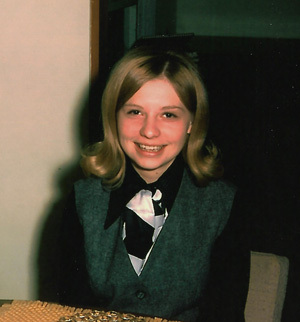 As a child, Nanci spent most of her free time playing with children in her neighborhood. She was often the ringleader and activity planner.
As a child, Nanci spent most of her free time playing with children in her neighborhood. She was often the ringleader and activity planner.
Nanci’s family attended Powell Valley Covenant Church, enjoyed camping, and often went to their family beach cabin in Manzanita, built by her dad. Nanci loved going to summer camp at Covenant Beach Bible Camp in Des Moines, Washington.
Nanci attended Youngson Elementary School through 6th grade, then Kellogg Middle School for 7th and 8th grade. She graduated from Franklin High School in 1972.
Nanci and Randy met on December 7, 1968, in their freshman year of high school. She invited him to youth group at Powell Valley church. In August 1969, just before their sophomore year, Randy placed his faith in Christ. Nanci and Randy never dated anyone else after they met. They knew and loved each other for 54 years, from age 14 to 68.
Nanci and Randy were active in the Powell Valley Church high school group. Nanci attended events at Franklin High and spent a lot of time with Randy at the brand-new Barlow High School. She was at Barlow sporting events and concerts so often that many assumed she attended there! After graduating, Nanci and Randy together attended Multnomah School of the Bible, where she later worked.
Randy and Nanci married at Powell Valley Covenant Church May 31, 1975, 47 years ago this month. Then in March 1977, they were part of the Bible study at Norm and Dottie Norquist’s house that two months later became Good Shepherd Community Church, where Randy was one of the two original pastors. Nanci served the church faithfully through youth groups, Sunday School, and Bible studies.
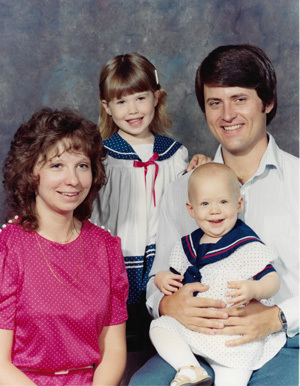 Nanci and Randy both dearly loved raising their daughters Karina and Angela. They had many wonderful times together at home and at church, and on vacations, including at the Noren beach cabin in Manzanita. Nanci loved Disneyland and other Southern California theme parks and was always eager to take her kids there. She traveled with Randy and sometimes with the girls, all over the world. When Karina and Angela were nearly nine and seven, the family took a two-month trip to visit Good Shepherd missionaries in Egypt, Kenya, Greece, Austria, and England.
Nanci and Randy both dearly loved raising their daughters Karina and Angela. They had many wonderful times together at home and at church, and on vacations, including at the Noren beach cabin in Manzanita. Nanci loved Disneyland and other Southern California theme parks and was always eager to take her kids there. She traveled with Randy and sometimes with the girls, all over the world. When Karina and Angela were nearly nine and seven, the family took a two-month trip to visit Good Shepherd missionaries in Egypt, Kenya, Greece, Austria, and England.
Years later, Nanci and Randy were delighted to see their daughters, in the same summer, marry wonderful, godly men. And then came grandchildren, whom Nanci never stopped thinking about. She loved watching football, tennis, basketball, and every other sport her daughters and grandsons played.
Nanci was diagnosed with cancer in January 2018. Over the next four years she had three surgeries, and three rounds each of chemotherapy and radiation. Though her doctor said two months ago that Nanci might live another year and a half, within a week, Nanci sensed she had much less time than that.
Nine days before she died, she asked that her whole family come so she could see them and speak to them. All 11 of us gathered in her room around her hospital bed. Though for weeks she had hardly been able to speak a sentence, God gave her strength to share words of love and encouragement.
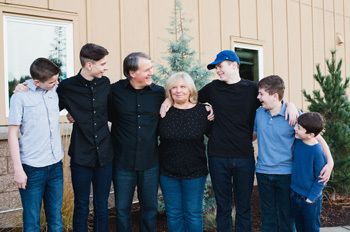 Randy then read to the family powerful portions from her handwritten journal, affirming the sovereignty and goodness of God. She encouraged her family to trust fully in God’s love, and His providential purposes. Together we prayed over her, and throughout the day different family members held her hand and spoke to her, sometimes as she slept.
Randy then read to the family powerful portions from her handwritten journal, affirming the sovereignty and goodness of God. She encouraged her family to trust fully in God’s love, and His providential purposes. Together we prayed over her, and throughout the day different family members held her hand and spoke to her, sometimes as she slept.
Nanci and Randy talked often about Romans 8 where it says the whole creation groans under the Curse and is longing for resurrection day. They delighted in anticipating what God has in store for us on the New Earth. She often told Randy that she was asking Jesus to let her serve Him by living near the water and taking care of dogs and otters, as well lions, cheetahs, dolphins, monk seals, manta rays, and whales (she never mentioned eels).
 Nanci walked her dogs for the joy it gave them and her, but it became a ministry in which she developed relationships with other dog-owners, giving them gospel-centered books and inviting them to church and Bible studies. She also led women’s Bible study at her church for decades, and delighted in seeing people come to faith in Christ and develop a bigger view of God. Many who were in her groups sent notes in her final weeks and after her death saying things such as, “I learned so much about God’s Word from Nanci, I always knew she loved me, AND she was SO much fun!”
Nanci walked her dogs for the joy it gave them and her, but it became a ministry in which she developed relationships with other dog-owners, giving them gospel-centered books and inviting them to church and Bible studies. She also led women’s Bible study at her church for decades, and delighted in seeing people come to faith in Christ and develop a bigger view of God. Many who were in her groups sent notes in her final weeks and after her death saying things such as, “I learned so much about God’s Word from Nanci, I always knew she loved me, AND she was SO much fun!”
Nanci’s family and friends already miss her cheerful and playful personality, her contagious laugh, her eternal perspective, her love for life, and above all, her love for the God she trusted.
A few days before Jesus took her home, one of the women who was in her Bible study groups, Marie, texted her this, and many others have spoken similarly: “I love you, Nanci, my dearest friend, and I thank YOU for my love of God. I will never forget you. You are my teacher and my mentor.”
May 13, 2022
What Faith Is, and Is Not

On November 14, 2019, Nanci wrote the following in her journal:
Today I am thinking about “faith.” I have learned so much about faith.
What faith is not:
- Trying to gather as much hope and “possibilities” in my own mind to reach a certain level
- Believing in that level of possibilities as hard as I can
- Presenting that package of my own hopes and dreams to God as my personal qualification to receive my hopes and dreams
- God weighing the level of that package in order to determine the level of His answer to my prayers
- If I work up enough hope on my own, God will answer my prayers according to my wishes
What faith is:
- A deep and continued study of the character and work of God Almighty
- A deep and continued discipline of prayer—listening to the Holy Spirit—praying Scripture—seeking forgiveness—asking for enlightenment—praising Him for His character and works
- Then, based upon the above, submitting your requests to God Almighty—placing your well-grounded knowledge of His character and works into each request, always asking His will be done
Faith is being assured that God Almighty always acts according to His character and works. He never waivers. You can trust in God Almighty to always do the right thing. Nothing slips through His grid. God has everything planned, and all His plans will succeed.
The more I understand God’s character and works, the stronger my faith will be, and the more I want His will to be done.
God does all things well.
The more I understand God’s:
- Omniscience
- Omnipotence
- Grace
- Mercy
- Justice/worth
- Immanence
- Immutability
- Faithfulness
- Love
- Unity—Trinity
- Holiness
The more my faith in Him will calm my soul.
Randy again: Some people hold tenaciously to a faith that their child will not die, that their cancer will disappear, that their spouse will recover from a stroke. Do they have faith in God or is their faith in what they desperately want God to do?
If we base our faith on lack of affliction, our faith lives on the brink of extinction and will fall apart at any moment because of a frightening diagnosis or a shattering phone call. Token faith will not survive suffering, nor should it. Only when we jettison ungrounded and untrue faith can we replace it with valid faith in the true God—faith that can pass, and even find strength in, the most formidable of life’s tests.
God tells us that trials in which evil and suffering come upon us “have come so that your faith—of greater worth than gold, which perishes even though refined by fire—may be proved genuine and may result in praise, glory and honor when Jesus Christ is revealed” (1 Peter 1:7). Paul Tournier wrote, “If healing through faith is striking, how much more so are spiritual victories without healing.”
Several years ago, before Nanci was diagnosed with cancer, I wrote this in a blog titled “If I Have Enough Faith, Will God Heal Me?”:
We should pray for ourselves and our suffering loved ones, not simply try to pray away suffering. ‘God, please heal this cancer’ is appropriate. ‘God, please use for your glory this cancer, so long as I have it’ is equally appropriate.
Let me be clear: God can and sometimes does heal presently, and whenever He does we should celebrate His mercy! I have often prayed for healing and sometimes I have witnessed it, and it’s a wonderful thing to behold and celebrate. But ultimately, all healing in this world is temporary, since people’s bodies inevitably deteriorate and die (after Lazarus died and was risen in his mortal body, eventually he had to die again) Resurrection healing will be permanent. For that our hearts should overflow with praise to our gracious God.
Nanci and I have long known that prosperity theology, or the health and wealth gospel, is a deception, not the true gospel. So we did not even once cling to the “certainty” that God would heal her in this world under the Curse.
Nanci’s journals overflow with the promises of God, and many quotes from Spurgeon and the Puritans, people who died long ago (some of whom she probably already met—if there is a line for those waiting to meet Spurgeon, she’s probably in it having delightful conversations). Nanci never quoted from aging and dying prosperity preachers, who will all die of something and daily get closer to death even as they promise “It’s always God’s will to heal you,” typically adding “send us your prayer requests for healing, along with a love offering [money].”
Though we prayed for it every night for four years, we understood that healing was never a certainty, and also knowing full well that sometimes He chooses to heal and sometimes He doesn’t, and even when He does the healing is temporary, and death always comes. “For death is the destiny of every person, and the living should take this to heart” (Ecclesiastes 7:2). When doctors told us Nanci was going to die, she told me, “We always knew that, we just didn’t know when, and we still don’t.”
But of course, God promises the death of death. He will not let it die a natural death, He will decisively “swallow up death forever” (Isaiah 25:8). Death will not have the last word. God will.
Jesus said to Martha, mourning the death of her brother Lazarus, “I am the resurrection and the life. The one who believes in me will live, even though they die; and whoever lives by believing in me will never die. Do you believe this?” (John 11:25-26).
Answering the question Jesus asked Martha, Nanci and I both said yes—we DO believe you, Jesus. We believe that even when we die, we will live, and in the sense of final death we will never die at all. We will depart a cursed earth to live with Him in the present Heaven, from which He will one day bring our spirits down to join our bodies in resurrection, and we will then live forever on God’s New Earth.
Nanci Alcorn's Memorial Service - Sunday, May 15
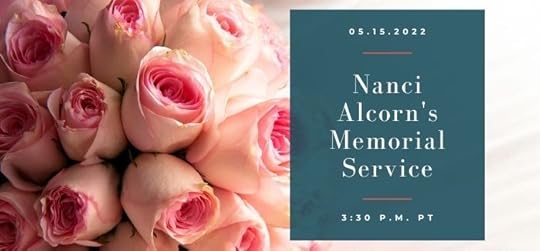
Nanci's service will be held Sunday, May 15 at 3:30 p.m. PT at Good Shepherd Community Church, 28986 SE Haley Rd, Boring, Oregon. A live stream will be available on YouTube and on the EPM site (the recording will also be available at that web address after the service).
Photo by Timothy Eberly on Unsplash
May 11, 2022
The Storm Has a Bit in Its Mouth

I’ve mentioned that Nanci’s journal she kept over the last four years of her cancer contains many Charles Haddon Spurgeon quotes. A few months ago she wrote down some profound sentences from this sermon by Spurgeon, titled “Safe Shelter.” It seemed right to share more of it with you.
I don’t know if Nanci has met him yet, but CHS is on her shortlist of people she is eager to thank! Mine too. God has reached countless millions through Spurgeon’s sermons and books, but if the only one who ever read him was my wife, the impact on her life alone, and on mine and many others through her, would have been worth it. (I don’t know whether she’ll break the news to him that he and I are co-authors of the book We Shall See God!)
Preaching on Psalm 91:4, “He shall cover you with His feathers, and under His wings shall you trust,” Spurgeon says this:
The Lord here compares Himself to a hen covering her brood—and He speaks not only of the wings, which give shelter, but He enters into detail and speaks of the feathers which give warmth and comfort and repose. “He shall cover you with His feathers and under His wings shall you trust.”
Using thus the maternal instinct as an emblem of His own parental tenderness, God compares Himself to the mother bird which fosters, cherishes and protects her little ones. You have stood, sometimes, in the farmyard and there you have noticed the little chicks as they cowered down under the hen. She has given some note of warning that betokened danger—perhaps your very presence discomposed her and made her betray some little fluttering of fear. She called her little ones by her peculiar cry. They came to her and then, stooping down and spreading out her wings, she covered them and they were safe.
You would have noticed that after they were safely nestled there, the warmth of her feathers made them seem peculiarly happy and at ease. You could hear them clucking to one another and playfully pushing one another sometimes out of their places, but evidently cheerful, contented and peaceful. It was something more than the protection which a soldier would give to a comrade—it was the protection of a mother of her young. There was love in it. There was homeliness, relationship, kindliness, heart-working in it all. It was not merely the relief that might supply a little cold comfort, but the breast feathers came down upon the little ones and there they rested cozily and comfortably, serene and unmolested.
…Not only is protection from danger vouchsafed, but a sense of comfort and happiness is communicated, making the child of God feel that he is at home under the shadow of the Almighty. He feels he has all the comforts that he can need when he has once come to cower down under a blessed sense of the Divine Presence and to feel the warm flowing out of the very heart of God, as He reveals Himself in the most tender relationship towards His weak and needy servants.
Carrying this picture in your mind's eye, may it often cheer and encourage you. Though I have nothing new, no bewitching novelty to introduce to you, I want to bring this old, old Truth of God vividly before your minds, to examine it in detail and press it home to your souls.
…WHEN MAY THIS TEXT BE RELIED UPON BY A BELIEVER? “He shall cover you with His feathers and under His wings shall you trust.” Well, it may be relied upon in cases of extreme peril. I do not doubt that servants of God, in times of danger at sea, when the huge billows have roared and the tempest has raged and the vessel seemed likely to go to pieces, have often cheered their hearts with such a thought as this. “Now, He that holds the waters in the hollow of His hand will take care of us, and cover us with His feathers and under His wings may we trust.”
Perhaps at this very moment, down in some cabin, or amidst the noise and tumult and the raging of the ocean, when many are alarmed, there are Christians with calm faces, patiently waiting their Father's will, whether it shall be to reach the port of Heaven, or to be spared to come again to land into the midst of life's trials and struggles once more. They feel that they are well-cared for. They know that the storm has a bit in its mouth and that God holds it in and nothing can hurt them—nothing can happen to them but what God permits.
On the dry land, too, the same blessed text has often comforted the Lord's people. Some are particularly timid in times of storm when the thunder comes, peal after peal and the lightning flashes follow each other—when it seems as if the very earth did tremble and the skies fled away from the glance of an angry God.
Oh, how it calms the anxious heart, stills the foreboding fears, and makes the heart tranquil to feel that He covers us with His feathers and that under His wings we may trust! I always feel ashamed to stay indoors when peals of thunder shake the solid earth and lightning flashes like arrows from the sky. Then God is abroad and I love to walk out in the open space and to look up and mark the opening gates of Heaven as the lightning reveals far beyond and enables you to look into the unseen.
I like to hear my heavenly Father's voice, but I do not think we could ever come to a state of peace in such times as those if we did not feel that He was near—that He was our Friend—that He would not hurt the children of His own love. It would be contrary to His own Nature and altogether apart from the kindness of His Character, as well as the constancy of His Covenant engagements, that He should suffer anything to touch His people that could do them real ill.
Nanci Alcorn's Memorial Service

Nanci's service will be held Sunday, May 15 at 3:30 p.m. PT at Good Shepherd Community Church, 28986 SE Haley Rd, Boring, Oregon. A live stream will be available on YouTube and on the EPM site (the recording will also be available at that web address after the service).
Photo by Johannes Plenio on Unsplash



